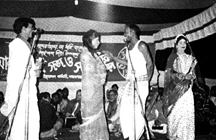Alkap Gan
Alkap Gan a regional genre of folk performance, somewhat similar to jatra, popular in rajshahi as well as in Murshidabad, Birbhum and Maldaha, west bengal. It is a composite performance comprising acting, dancing, singing, recitation together. An alkap group consists of ten to twelve artistes, led by a sarkar (master) or guru. The group also includes two or three young boys called chhokras and one or two gayens or singers. The rest comprise dohar, choristers, and musicians. Alkap performances take place at night on an open stage, which is lit by lanterns, popularly known as hyajak bati. The audience stand or sit around the stage, leaving a narrow passage for the performers.

There are two main parts of an alkap performance: songs and witty dialogue in prose or verse. Usually, the themes of the songs are drawn from mythological tales, particularly the story of radha and krishna, while the subjects of the dialogue relate to contemporary social events. Sometimes the audience also joins in. The main attraction of alkap performances, however, are the chhokras (boys) who dance, dressed as girls, between the singing and acting. Good-looking boys are trained to become chhokras and become quite expert in performing the salacious dances known as khemta and jhumur. There are also clowns to make the audience laugh.
The singers sit on the stage while the musicians sit below it, on one side. The instruments that accompany the alkap performance are the drum, harmonium, tabla, tambourine, flute etc. The musicians sit throughout the performance. The sarkar enters first, singing a vandana or hymn. He then recites verses that introduce the main theme of the drama. Then he and the main singers start the alkap, while the choristers help them by repeating the burden of the song.
Though the alkap is similar to jatra, it is more of a song-and-dance performance than the jatra which is closer to a play. The actors in a jatra have designated parts and a set dialogue to speak. In the alkap, however, the performers have a notion of the storyline and, in the manner of the Italian commedia dell' arte, improvise on stage. The attraction of the alkap lies in the vulgar jokes and sexual dances, which also make it necessary for alkap performances to be staged late at night and at some distance from the village. At present, when television and films have reached the remotest villages, the popularity of the alkap has decreased and it is on its way to extinction. [Wakil Ahmed]
